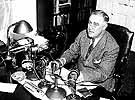
|
|
|

|

|

|

|
|
Click on an image to see a larger, more detailed picture.
|
|
|
|
|
| 1944: Desperate Acts |

|
pg. 535 |

|
|
|
|
| |
 America and the Jews
America and the Jews
On June 6, 1944, American soldiers hastened the end of World War II in Europe by joining British and Canadian troops in the D-Day invasion at Normandy, France. Only the defeat of Nazi Germany would stop the Holocaust, and the United States played a vital part in crushing the Third Reich. Nevertheless, the U.S. government never made the saving of European Jewry a top priority. Germany did not declare war on the United States until December 11, 1941. By then the murderous Einsatzgruppen had shot hundreds of thousands of Eastern European Jews, gassing operations had started at Chelmno, Poland, and the Nazis had killed nearly one million Jews since the beginning of 1941. Calling the "wholesale systematic murder of the Jews" one of the "blackest crimes of all history," U.S. President Franklin Roosevelt (pictured) promised on March 24, 1944, that the perpetrators would not "go unpunished." Still, the plight of Europe's Jews was never considered a decisive reason for America's involvement in the war. On a plaque accompanying New York's Statue of Liberty are the words of Emma Lazarus, an American-Jewish poet: Give me your tired, your poor, Your huddled masses yearning to breathe free, The wretched refuse of your teeming shore. Despite these words, strong anti-immigration, antisemitic, and, at times, isolationist currents surged through American life. During the 31/2 years that the United States waged war against Nazi Germany, State Department policies allowed only 21,000 refugees to enter the country, just ten percent of those who could have been legally admitted under the already restrictive quotas. Not until the summer of 1944 did the United States make special provisions to bring Jewish refugees to America, and even these were inadequate. Roosevelt issued instructions that the group should "include a reasonable proportion of various categories of persecuted peoples." On June 9, 1944, he announced that 1000 refugees outside the immigration quota could be accommodated temporarily in an "Emergency Refugee Shelter" at Fort Ontario, an obsolete army facility 35 miles northwest of Syracuse, New York. The actual arrivals numbered 982, 89 percent of them Jewish. American attitudes toward this token gesture were mixed, for antisemitism was widespread in the United States. From 1938 to 1941, national public-opinion polls indicated that one-third to one-half of the American people felt that Jews had "too much power in the United States." After 1941, and throughout America's war years, agreement with that proposition rose above 50 percent. While Americans fought the war that defeated Nazi Germany and ended the Holocaust, 15 to 24 percent of American survey respondents said that Jews were "a menace to America."
Photo: Archive Photo
|
|

|

|

|

|
 June 24, 1944: The United States Military Air Operations declares that bombing rail lines to Auschwitz is "impracticable" because it could be achieved only by diverting air support from "decisive operations" in progress; i.e., bombing German synthetic-oil plants. The fact is that many of these plants are located near Auschwitz.
June 24, 1944: The United States Military Air Operations declares that bombing rail lines to Auschwitz is "impracticable" because it could be achieved only by diverting air support from "decisive operations" in progress; i.e., bombing German synthetic-oil plants. The fact is that many of these plants are located near Auschwitz.
|
 June 24, 1944: Lovers Edward Galinski, a Polish gentile, and Mala Zimetbaum, a Jew, escape from Auschwitz-Birkenau in purloined SS uniforms and remain at liberty for two weeks.
June 24, 1944: Lovers Edward Galinski, a Polish gentile, and Mala Zimetbaum, a Jew, escape from Auschwitz-Birkenau in purloined SS uniforms and remain at liberty for two weeks.
|
 June 25, 1944: Pope Pius XII sends a telegram to Admiral Miklós Horthy, regent of Hungary, asking him to stop the deportation "to an unknown destination" of Hungarians because of their race. The Pope does not use the word "Jew" in his messages.
June 25, 1944: Pope Pius XII sends a telegram to Admiral Miklós Horthy, regent of Hungary, asking him to stop the deportation "to an unknown destination" of Hungarians because of their race. The Pope does not use the word "Jew" in his messages.
|
 June 27, 1944: Jewish Resistance leader David "Dodo" Donoff, 24, is executed near Lyons, France.
June 27, 1944: Jewish Resistance leader David "Dodo" Donoff, 24, is executed near Lyons, France.
|
|
|
|
|
| 1944: Desperate Acts |

|
pg. 535 |

|
|
The Holocaust Chronicle
© 2009 Publications International, Ltd.
|
|
